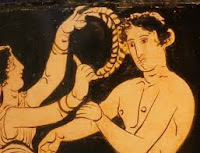 |
| Engraving of Ezekiel by Gustav Doré |
To all sins, then, committed whether by flesh or spirit, whether by deed or will, the same God who has destined penalty by means of judgment, has withal engaged to grant pardon by means of repentance, saying to the people, “Repent, and I will save you.” And again, “I live, says the Lord, and I will (have) repentance rather than death.” Repentance, then, is “life,” since it is preferred to “death.” That repentance, O sinner, like myself (nay, rather, less than myself, for preëminence in sins I acknowledge to be mine), do you so hasten to, so embrace, as a shipwrecked man the protection of some plank. This will draw you forth when sunk in the waves of sins, and will bear you forward into the port of the divine clemency. Seize the opportunity of unexpected felicity: that you, who sometime were in God’s sight nothing but “a drop of a bucket,” and “dust of the threshing floor,” and “a potter’s vessel,” may thenceforward become that “tree which is sown beside the waters, is perennial in leaves, bears fruit at its own time,” and shall not see “fire,” nor “axe.” Having found “the truth,” repent of errors; repent of having loved what God does not loves: even we ourselves do not permit our slave-lads to not hate the things which are offensive to us; for the principle of voluntary obedience consists in similarity of minds.
To reckon up the good, of repentance, the subject matter is copious, and therefore should be committed to great eloquence. Let us, however, in proportion to our narrow abilities, inculcate one point,—that what God enjoins is good and best. I hold it audacity to dispute about the “good” of a divine precept; for, indeed, it is not the fact that it is good which binds us to obey, but the fact that God has enjoined it. To exact the rendering of obedience the majesty of divine power has the prior right; the authority of Him who commands is prior to the utility of him who serves. “Is it good to repent, or no?” Why do you ponder? God enjoins; nay, He not merely enjoins, but likewise exhorts. He invites by (offering) reward—salvation, to wit; even by an oath, saying “I live,” He desires that credence may be given Him. Oh blessed we, for whose sake God swears! Oh most miserable, if we believe not the Lord even when He swears! What, therefore, God so highly commends, what He even attests on oath, we are bound of course to approach, and to guard with the utmost seriousness; that, abiding permanently in the solemn pledge of divine grace, we may be able also to persevere in like manner in its fruit and its benefit.
Tertullian, On Repentance 4






